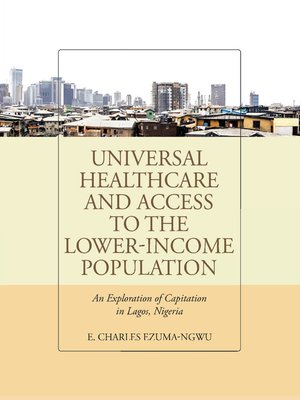Universal Healthcare and Access to the Lower-Income Population
ebook ∣ An Exploration of Capitation in Lagos, Nigeria
By E. Charles Ezuma-Ngwu

Sign up to save your library
With an OverDrive account, you can save your favorite libraries for at-a-glance information about availability. Find out more about OverDrive accounts.
Find this title in Libby, the library reading app by OverDrive.



Search for a digital library with this title
Title found at these libraries:
| Library Name | Distance |
|---|---|
| Loading... |
This book presents a research-based exploration of Universal Healthcare and the benefits of healthcare providers' capitation payment method in many developing economies. The author begins the research study by describing the history of healthcare in Nigeria and exposes a country's healthcare problem that must be addressed to ensure healthcare access to the low-income population. The book leads the reader through perspectives on the major world's healthcare payment systems, which include (a) diagnosis-related group (DRG); (b) pay-for-performance (P4P); (c) global budgeting payment systems; (d) fee-for-service (FFS) payment system; and (e) a provider-based capitation payment (PBCP) system. The author provides further review on the advent of geospatial mapping and healthcare, PBCP in lower- and middle-income countries (LMIC), and the current conditions at private outpatient medical centers (POMC) in Lagos, Nigeria. The study's qualitative approach called for an inductive and deductive data analysis, with a bottom-up approach to building patterns and a comprehensive set of themes. To visualize the results of the predominant fee for Service (FFS) healthcare payment method in many developing economies and its associated catastrophic health outcomes, the study presents geospatial maps of this urban city and the socio-economic issues it produces. To deliver a successful capitation payment model for healthcare providers in Lagos, Nigeria, the author incorporated a framework model that included incentives and sanctions through an indirect principal-agent relationship, where the principal (enrollees) holds the government accountable for the healthcare provider's actions (Baez-Camargo & Jacobs 2013). The study in this book concludes by delivering a visual template for transitioning from FFS based healthcare payment system to a more productive environment for both healthcare providers and patients to deliver and receive quality health outcomes and reach the lower-income population.







